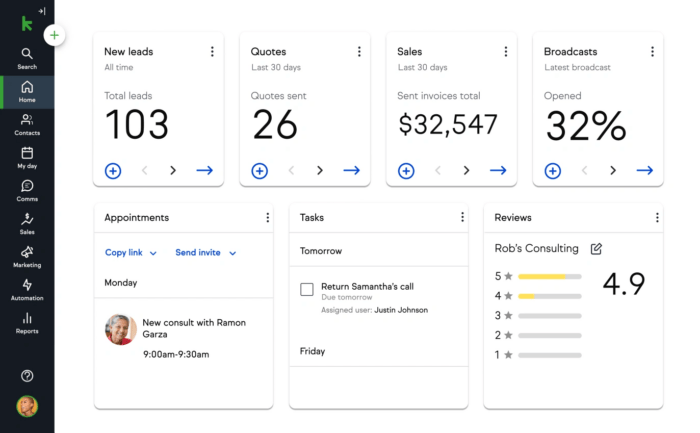Software to manage sales leads – In today’s competitive market, effective sales lead management is crucial for business success. A robust sales lead management system can streamline your sales process, improve efficiency, and ultimately boost revenue. This guide dives deep into the world of sales lead management software, exploring its various features, benefits, and how to choose the right solution for your needs. We’ll cover everything from basic lead capture to advanced analytics, helping you make informed decisions and maximize your return on investment.
Understanding Sales Lead Management Software
Sales lead management software, sometimes referred to as CRM (Customer Relationship Management) software with a focus on leads, is a powerful tool that helps businesses track, organize, and nurture potential customers. It provides a centralized platform to manage the entire sales funnel, from initial contact to closing the deal. This includes tasks like lead scoring, automated email marketing, and sales pipeline management.
Key Features of Effective Sales Lead Management Software
- Lead Capture and Qualification: Crucial for efficiently identifying and prioritizing potential customers. This involves forms, landing pages, and automated workflows for qualifying leads.
- Lead Organization and Segmentation: Categorizing leads based on various criteria (industry, location, demographics, etc.) for targeted outreach.
- Lead Nurturing: Automated email sequences, personalized content, and targeted marketing campaigns to move leads through the sales funnel.
- Sales Pipeline Management: Visual representation of the sales process, allowing tracking of deals from initial contact to closure.
- Reporting and Analytics: Provides insights into sales performance, lead conversion rates, and other key metrics for data-driven decision-making.
- Integration with Other Tools: Seamless integration with email marketing platforms, marketing automation tools, and other essential business applications.
Choosing the Right Sales Lead Management Software
Selecting the right software depends heavily on your specific business needs. Consider factors like the size of your sales team, the complexity of your sales process, and your budget. Here’s a breakdown of important considerations:
Factors to Consider When Choosing Sales Lead Management Software
- Scalability: The software should be able to adapt to your business’s growth and accommodate increasing numbers of leads.
- Ease of Use: A user-friendly interface will ensure efficient adoption and usage by your team.
- Customization Options: The ability to tailor the software to your specific workflows and requirements is vital.
- Customer Support: Reliable customer support is crucial for resolving issues and providing assistance when needed.
- Pricing and Value Proposition: Evaluate the cost-benefit ratio to ensure you’re getting a good return on investment.
Implementing and Maximizing Your Sales Lead Management Software: Software To Manage Sales Leads
Successful implementation and use of sales lead management software are key to its effectiveness. Consider these best practices:
Best Practices for Lead Management Software Implementation, Software to manage sales leads
- Define Clear Goals and Objectives: Establish specific targets for lead generation, conversion, and overall sales growth.
- Integrate with Existing Systems: Connect the software with your CRM, marketing automation, and other relevant tools.
- Train Your Team: Ensure your sales and marketing teams are properly trained on the software’s functionalities.
- Regularly Monitor and Analyze Performance: Track key metrics and adjust your strategies based on the insights gained.
- Stay Updated with Software Updates: Ensure you’re taking advantage of new features and improvements.
Frequently Asked Questions (FAQ)
Here are some common questions about sales lead management software:

Source: clickup.com
- Q: How much does sales lead management software cost?
A: Pricing varies greatly depending on the features, number of users, and the chosen vendor. Contact potential providers for detailed pricing information.
- Q: What are the benefits of using sales lead management software?
A: Benefits include increased efficiency, improved lead tracking, better sales pipeline management, and enhanced decision-making through data insights.
- Q: How do I choose the right software for my business?
A: Consider factors like scalability, ease of use, customization, customer support, and pricing when making your decision.
Sources:
Conclusion and Call to Action
Sales lead management software is a powerful tool for boosting sales productivity and efficiency. By understanding its features, choosing the right solution, and implementing best practices, businesses can significantly improve their lead management process. Don’t let potential customers slip through the cracks. Invest in a robust sales lead management system today and watch your sales soar!
Ready to take your sales lead management to the next level? Explore our recommended software solutions and start improving your sales pipeline today!
FAQ Resource
How much does software to manage sales leads typically cost?
Pricing for sales lead management software varies significantly depending on the features, the number of users, and the chosen subscription model. Some offer basic plans at a lower cost, while more comprehensive solutions come with higher price tags. It’s best to contact potential vendors directly for personalized quotes.

Source: phpcrm.com
What are the key features to look for in sales lead management software?
Essential features include lead scoring, automated follow-up, CRM integration, reporting and analytics dashboards, and customization options. These features ensure that the software seamlessly integrates with existing systems and provides valuable insights into lead behavior.
Can I integrate this software with my existing CRM?
Many sales lead management software solutions offer seamless integration with popular CRM platforms. This integration allows for a unified view of customer interactions and data across all systems.